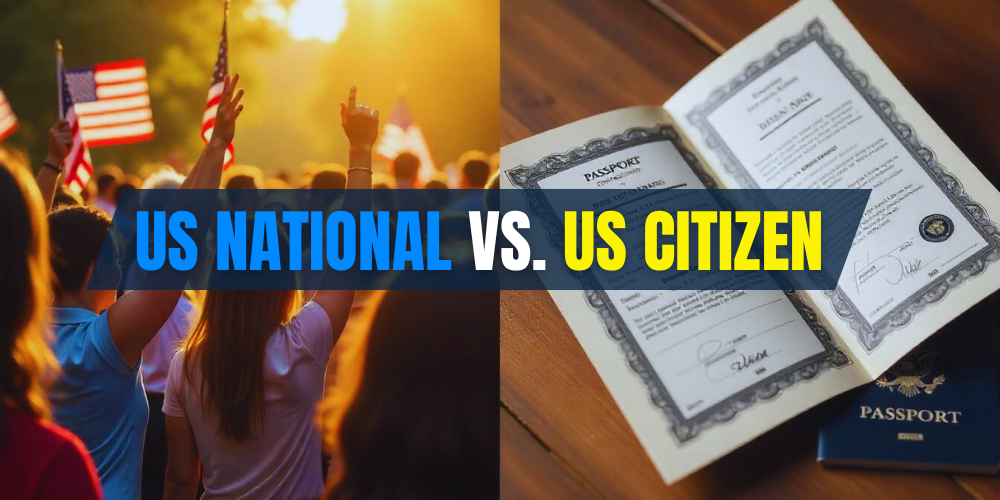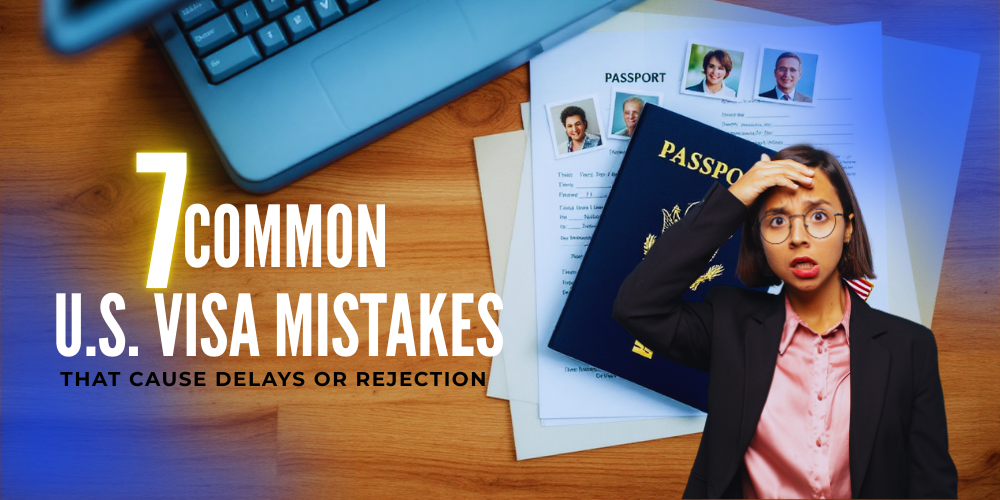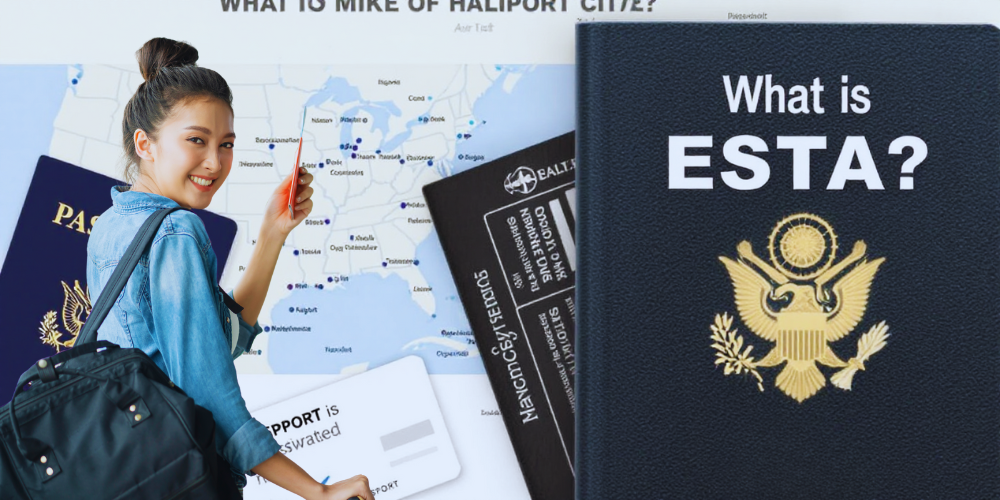--------- US National vs. US Citizen: Key Differences You Need to Know
Apr 22, 2025

Imagine you're chatting with a friend about your latest travel adventures. You casually mention something about "US nationals" and "US citizens," and suddenly your friend pauses, puzzled. "Wait, aren't those the same thing?" they ask.
Actually, no—they're not quite the same. While all US citizens are US nationals, the reverse isn't necessarily true. Surprising, right? This little-known distinction can be quite important, especially in terms of rights, responsibilities, and opportunities. Let’s dive into the specifics and clear up this common confusion.
What Exactly is a US National?
A US national is someone who owes permanent allegiance to the United States but doesn't necessarily enjoy all the benefits or bear all the responsibilities of a US citizen. Essentially, being a US national means you’re under the protection of the US government and have certain legal ties, but you might not have the full suite of rights, especially the right to vote in federal elections.
Where Do US Nationals Typically Come From?
Most US nationals are individuals born in US territories. Currently, the main group of people who hold US national status (without automatic citizenship) are those born in American Samoa or on Swains Island. These territories have unique historical and legal statuses, making their residents nationals by birth, rather than citizens.
So, Who is a US Citizen?
A US citizen is a more familiar term for most people. Citizenship is a step beyond nationality—it's like having a full membership card to the country club, complete with all the perks and duties that come with it. Citizenship includes the right to vote in federal elections, eligibility for federal jobs, and the ability to run for political office.
Ways to Acquire US Citizenship
- Birthright Citizenship: Anyone born on US soil, including states and most territories like Puerto Rico and Guam, is automatically granted citizenship.
- Through Parents: If your parents are US citizens, you may automatically acquire citizenship at birth, even if born abroad.
- Naturalization: Foreign nationals can become citizens through a legal process involving residency, background checks, interviews, and a citizenship exam.
Key Differences Between a US National and a US Citizen
1. Voting Rights
One of the most significant differences is the right to vote. US citizens can vote in all federal, state, and local elections. US nationals, however, are typically not eligible to vote in federal elections, although they might participate in local elections, depending on territory laws.
2. Holding Public Office
Only US citizens can run for federal office, such as the presidency, Congress, or certain federal government positions. Nationals, without citizenship status, don't qualify for these roles.
3. Passport and International Travel
Both US nationals and US citizens hold US passports, but the passport types differ slightly. A US national’s passport explicitly states their nationality without full citizenship status. Internationally, this distinction rarely affects travel rights, but occasionally it can influence visas and international recognition.
4. Jury Duty
US citizens are required to perform jury duty as part of their civic responsibilities. US nationals typically are exempt from this obligation.
5. Protection and Consular Assistance
Both nationals and citizens enjoy consular protection abroad. The US government equally supports both groups if they encounter legal trouble overseas or require assistance from embassies and consulates.
6. Federal Jobs and Benefits
Federal employment opportunities usually require US citizenship, restricting nationals from certain jobs, particularly those involving security clearances. However, nationals still have access to many federal programs, including Social Security benefits and other forms of assistance.
Why Does This Distinction Even Exist?
The difference between a US national and a citizen largely arises from America's complex history involving territories. Territories like American Samoa have unique legal and historical relationships with the US, where residents hold allegiance but have never been granted full citizenship status automatically.
Residents of other US territories, such as Puerto Rico and Guam, were similarly categorized as nationals until Congress passed laws granting automatic citizenship. This has yet to happen for American Samoa, largely due to historical, cultural, and legal considerations unique to the territory.
Can a US National Become a Citizen?
Yes, absolutely—and many do! Nationals can apply for citizenship through naturalization. Unlike typical foreign nationals, US nationals enjoy an easier naturalization process. They must generally reside in a US state for at least three months, pass a simplified version of the citizenship test, and meet basic residency and moral character requirements. Once naturalized, nationals gain full citizenship rights.
Why Knowing the Difference Matters
Understanding the distinction between US nationals and citizens matters greatly, particularly for those affected. Nationals need clarity on their rights and limitations. For citizens, awareness fosters a deeper understanding of America's diverse identity and territorial nuances.
Additionally, for travelers or employers, recognizing this distinction can be essential. It helps prevent confusion about passport types, employment eligibility, and legal rights.
Future Outlook: Could Things Change?
The status of US nationals, particularly from territories like American Samoa, has become increasingly debated in recent years. Some advocate granting automatic citizenship to nationals, believing it ensures equal treatment and rights. Others, particularly within the territories themselves, worry about potential cultural impacts and loss of autonomy. This debate continues to unfold, and future legislative or judicial actions might alter the distinction further.
Final Thoughts
So next time someone confuses US national and citizen, you'll confidently explain the nuances. It's more than just semantics—it affects real lives, rights, and responsibilities. While the terms might seem interchangeable at first glance, understanding their differences deepens your appreciation of American identity and the complexities of its legal and cultural landscape.
Whether you're chatting casually with friends or exploring more profound implications of nationality and citizenship, knowing these differences enriches your perspective on what it means to be connected to the United States.
Recent Articles

Top Digital Nomad Visas in 2026 (Portugal, Croatia, Estonia & More)
Remote work isn’t a trend anymore — it’s infrastructure. By 2026, governments aren’t just to

Seasonal Travel Planning: Spring in Europe (Visa Tips Included)
Spring—stretching from March through May—hits a sweet spot many travelers overlook. The continen

Best Schengen Countries to Visit with One Visa
A Schengen visa is one of the most powerful travel documents for exploring Europe. With a single app

ETIAS Explained: Europe’s New Travel Authorization System
Europe is shaking up short-stay travel, and if you’ve ever zipped across the continent visa-free,

7 Common U.S. Visa Mistakes That Cause Delays or Rejection
U.S. visa delays and refusals are rarely caused by a single dramatic mistake. More often, they stem

ESTA Explained: Who Needs It and How to Apply in 2026
The ESTA—short for Electronic System for Travel Authorization—is the quiet gatekeeper behind vis
Read More

Top Digital Nomad Visas in 2026 (Portugal, Croatia, Estonia & More)

Seasonal Travel Planning: Spring in Europe (Visa Tips Included)

Best Schengen Countries to Visit with One Visa

ETIAS Explained: Europe’s New Travel Authorization System

7 Common U.S. Visa Mistakes That Cause Delays or Rejection

ESTA Explained: Who Needs It and How to Apply in 2026

Welcome to the VisaTravel blog. We know that navigating the maze of visa applications and online forms can be as tricky as choosing the perfect travel playlist (which is all we want you worrying about anyway).
Throughout our years of experience, though, we’ve uncovered a mountain of knowledge which, via this blog, we’re sharing with you! Whether you're diving into the world of travel visas, wondering about the ESTA online hustle, or just trying to figure out the DS160 form, think of us as your online concierge, here to make the process easy and most of all, clear.
At this point in our global context, who has time for endless paperwork and confusing legal jargon? No one. That's why we're all about spilling the tea on online visa hacks, easier-to-work-with DS160 forms, and giving you tips on everything from tourist visas to immigration, to that last-minute ESTA online adventure.
So, just plug in a word you’re curious about on the search bar, and boom. We've got the tips, tricks, and insider info to help you (and anyone else you may be traveling with) get to your travel destination with the confidence of a seasoned traveler.
Now go explore!
 U.S. Visa
U.S. Visa
 Canada eTA
Canada eTA
 Schengen Visa
Schengen Visa
 New Zealand eTA
New Zealand eTA
 United Kingdom eTA
United Kingdom eTA
 Australia eVisitor
Australia eVisitor
 Vietnam eVisa
Vietnam eVisa
 Egypt eVisa
Egypt eVisa
 Singapore Arrival Card
Singapore Arrival Card
 Sri Lanka eVisa
Sri Lanka eVisa




